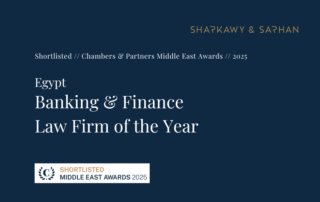11th of January, 2017
The Executive Regulation of the Movable Guarantees Law
By: Lamiaa Youssef
Keywords: Banking & Finance, Commercial
The Executive Regulation of the Law On Pledge of Movables is out and it still leaves a few issues unanswered. The Ministry of Investment (the “MOI”) promulgated the Executive Regulation (“ExecReg”) of Law 115/2015 (“the Movable Guarantees Law”). The ExecReg came into force on December 5, 2016.
The purpose of the Movable Guarantees Law is to facilitate the granting of security over movable assets outside the common framework of a mortgage over a business undertaking (fonds de commerce). It regulates the pledging of movable assets and specifies the types of assets that can be taken as collateral. These assets are defined under the Movable Guarantees Law to include all existing and future tangible and intangible movables. (For more information on the law itself, please check S&S’ previous update on the law.) The ExecReg clarified some of the ambiguities existing in the Movable Guarantees Law; however, it still leaves many issues unclear. In particular, ranking between different collateralization regimes and the ranking of collaterals effected before the law is not really clear.
The Ministry of Investment (the “MOI”) promulgated the Executive Regulation (“ExecReg”) of Law 115/2015 (“the Movable Guarantees Law”). The ExecReg came into force on December 5, 2016.
The purpose of the Movable Guarantees Law is to facilitate the granting of security over movable assets outside the common framework of a mortgage over a business undertaking (fonds de commerce). It regulates the pledging of movable assets and specifies the types of assets that can be taken as collateral. These assets are defined under the Movable Guarantees Law to include all existing and future tangible and intangible movables. (For more information on the law itself, please check S&S’ previous update on the law.) The ExecReg clarified some of the ambiguities existing in the Movable Guarantees Law; however, it still leaves many issues unclear. In particular, ranking between different collateralization regimes and the ranking of collaterals effected before the law is not really clear.
On Tuesday 27 December 2016, MOI called a meeting comprising various stakeholders from the legal, banking and regulatory community to discuss the ExecReg and to clarify some of the issues surrounding the new register. Sharkawy & Sarhan Law Firm is honored to have been invited to this much appreciated initiative by MOI and has found it very useful to clarify some of the ambiguities surrounding the implementation of this awaited register.
The meeting was attended by Mr. Sherif Samy, Chairman of the Egyptian Financial Supervisory Authority (EFSA) and Mr. Mohamed Khodeir, the Head of the General Authority for Investment (GAFI). Various officials from MOI and from the working group in charge of drafting the ExecReg and the guidelines for the new register were present to answer the questions of the legal and banking community attending the meeting.
We share below our comments on the law and some of the insights learned in this meeting.
The ExecReg defines the creditor and it does not include natural persons, inter-company lenders, or foreigners not authorized to operate in Egypt:
• The ExecReg defines the creditor as “the guaranteed person that is a bank or any entity that carries out financing activities, as well as other entities, which grant financing or credit. These include:
- Banks and financing institutions authorized to work in Egypt;
- Companies and other entities authorized to carry out financial leasing in Egypt;
- Non-governmental organizations and associations and companies authorized to carry out micro-financing;
- Entities authorized, or by their nature are expected, to carry out activities related or connected to providing financing or credit;
- Juristic persons and individual establishments authorized to carry out activities related to trading in movables, which can be pledged; and
- Juristic persons and natural persons who license intellectual property rights.
• The above definition suggests that only entities that habitually provide financing or trade in goods will be allowed to use the register. Accordingly, inter-company financing (for example, financing by an affiliate or by a board member) does not fall under any of the above categories will not be registered in the new register.
• In addition, MOI confirmed that except for pledges of intellectual property rights, only juristic persons will be allowed to register their collateral in the new register. Moreover, MOI confirmed that only Egyptian creditors and foreign creditors licensed to operate in Egypt in one of the above activities, may use the register. Accordingly, foreign lenders cannot secure their pledges using this register.
• It is not clear whether an agent for lenders may perfect the pledge in its name using this register or not. However, the language of item (4) of the definition of creditors above is wide enough to allow this. It remains to be seen whether any details in this regard will be included in the guidelines on the operation of the register to be issued by MOI.
And the Debtor?
• The ExecReg provides a new definition prescribing that the debtor in any registrable financing must be an Egyptian company or an Egyptian citizen or resident.
Registration in this register is optional, but it is detrimental to creditors not to register:
• The language of the Movable Guarantees Law (and also the ExecReg) seemed to suggest that registration is optional with regard to most movables, but obligatory in relation to a pledge of receivables, pledge of movables subject of a financial lease, and pledge of goods purchased for resale. However, the MOI orally confirmed that the registration is optional in all cases. Non-registration in this register will not make the pledge invalid.
• However, a creditor who does not register in this register will risk being outranked by a subsequent creditor who effects his pledge under the new register. In practice, once the register is implemented, a creditor cannot afford not to perfect the pledge using this register.
Ranking is still not entirely clear…
• The Movable Guarantees Law states that a registered collateral grants the secured creditor a higher rank security over other creditors with pledges effected under other regimes (see Articles 17, 24, and 25 of the Movable Guarantees Law). The date and time of registration in the online register will determine the ranking of the pledge. The Movable Guarantees Law also states that ranking pursuant to this register is secured and prevails over other securities, even if the other security arises on an earlier date under another regime (Article 17 of the Movable Guarantees Law).
• There seems to be some exceptions to this rule, but again, neither the Movable Guarantees Law nor the ExecReg is entirely clear about how such exceptions apply.
• In relation to a possessory pledge of movables effected under the Civil Law: Article 24 of the Movable Guarantees Law states that a pledge registered under the Movable Guarantees Law takes precedence over pledges effected under other laws “subject to the rights of creditors having a possessory pledge under the Civil Code.”
Example:
Let’s suppose:
- Creditor A takes a possessory pledge under the Civil Code on January.
- Then, Creditor B takes a pledge under the new register in February.
- Then, Creditor A registers his possessory pledge in the new register on March.
Is Creditor A’s ranking maintained from January pursuant to Article 24 of the Movable Guarantees Law, or has his ranking moved to March pursuant to Article 2(4).
• However, Article 2(4) states that in case a pledgee with a possessory pledge registers the pledge in this register, “such pledge shall be subject to the rules on ranking and enforcement prescribed in [the Movable Guarantees Law]”. It is not clear how ranking in this case applies. Yes, the Movable Guarantees Law is explicit that in the case of conflict in ranking between an early possessory pledge effected under the Civil Code and a later pledge effected under the new register, the possessory pledge will prevail. However, it is not clear what happens if a holder of an early possessory pledge decides later to register in the new register, after another pledgee has effected a pledge under the register. Consult the example on the right to understand what we mean.
• Article 2(4) needs to be clarified in the forthcoming guidelines.
• In relation to a pledge of fonds de commerce (Pledge of Commercial Enterprise): The Movable Guarantees Law was not explicit as to whether an earlier pledge of fonds de commerce will outrank a more recent pledge under the new register in the same way as it has explicitly indicated for possessory pledges under the Civil Law (see above). We were hoping the ExecReg will clear this up. Unfortunately, it was silent in this regard.
• Typically, a pledge of fonds de commerce is effected under Law No.11/1940 Regulating the Sale and Mortgage of Fonds de Commerce. Pursuant to this law, a pledgee needed to annotate the pledge in the commercial register of the enterprise for the pledge to be perfected. Under the new regime, a pledgee of fonds de commerce still needs to undertake this step. He may also to choose to subsequently register this pledge in the new register as well, In order to benefit from its privileges.
• The ExecReg provides that in order for a pledgee to register a pledge of fonds de commerce in the new register, the creditor must electronically attach a recent extract from the commercial register of the enterprise.
• The ExecReg did not expressly address what happens if a creditor effects a pledge of fonds de commerce under Law 11/1940 and another creditor effects another pledge of fonds de commerce, then takes the extra step of registering such pledge in the new online register. In such case, will the ranking of the first creditor still be maintained despite failure to register in the new register? The Movable Guarantees Law and the ExecReg are not entirely clear. (However, in a meeting called by the MOI, officials in charge of issuing the action steps for the new register orally emphasized that ranking will be maintained.) According to such officials, the register will take into consideration any other prior pledges apparent in the attached commercial register. Based on this, the applicant will be registered in the same ranking obtained in the commercial register. The guidelines of the Movable Guarantees Law, however, will still need to spell this out and provide adequate mechanism to ensure this effect.
• The same ambiguity applies on the pledge of intellectual property rights.
Rights of creditors taking pledges before the issuance of the Movable Guarantees Law may be prejudiced:
• The Movable Guarantees Law provides a special rule for pledges effected over a movable under any other regime prior to the issuance of the Movable Guarantees Law. It states that creditors who already have pledges over a movable under any regime prior to the law may choose to register in this Movable Guarantees Register as well. In such case, their ranking will be determined according to the previous regime they established the pledge under or as per the new law, whichever date is earlier. This is a special provision for pledges perfected before the law and does not apply to new pledges.
• The ExecReg did not provide much details about how this will be implemented, but officials from MOI stated that there will be a grace period before the entry of the Movable Guarantees Law into action, whereby holders of old pledges will be given a chance to register before new pledgees may perfect their pledges in the new register.
• Some of the bankers present in the meeting raised a point to the officials regarding the requirements of registering a pledge on the system, which they deem to undermine creditors with pledges taken before the Movable Guarantees Law. The ExecReg stipulates that, in order to perfect any pledge in this new register, the creditor must have a specific approval from the debtor to the effect that the latter approves registration pursuant to the Movable Guarantees Law. This approval may be in the form of a signature on the security agreement that contains such language or any other form proving the debtor’s acceptance. The problem arises for pledges taken before the law, since creditors may not have anticipated such requirement and may not be able to obtain such approval from debtors. In such case, some of the attendees noted that such creditors will not be able to register their pledges in the new register and will thus be disadvantaged vis-à-vis newer creditors who obtain pledges after the new law.
• We believe that there are ways to get around this omission in the ExecReg. If the financing documentation is properly structured, some of the general terms typically included in a well-drafted agreement may give the creditor the right to force the debtor to provide such approval. A properly drafted change of law clause or an undertaking on the borrower to assist the lender with all necessary documents and approvals enabling the lender to preserve his security may provide sufficient leverage to the creditor.
• However, it may also be useful if MOI considers providing a more general solution in the forthcoming guidelines. Possibly, the guidelines may provide exception from the requirement to submit an approval by the debtor in relation to pledges taken before the Movable Guarantees Law.
In the end, the Movable Guarantees Law is a very positive step to facilitate financing and hence boost businesses’ ability to grow. Great effort has been put to produce the ExecReg and establish the register. However, the ExecReg needs some clarifications to be effective. In particular, ranking of creditors needs to be thought through and detailed to avoid any problems associated with the implementation of the law. We are hopeful that the development of the detailed guidelines of operating the register (which the MOI expects to issue within 6 months) will provide much more details on this particular point.
The Ministry of Investment (the “MOI”) promulgated the Executive Regulation (“ExecReg”) of Law 115/2015 (“the Movable Guarantees Law”). The ExecReg came into force on December 5, 2016.
The purpose of the Movable Guarantees Law is to facilitate the granting of security over movable assets outside the common framework of a mortgage over a business undertaking (fonds de commerce). It regulates the pledging of movable assets and specifies the types of assets that can be taken as collateral. These assets are defined under the Movable Guarantees Law to include all existing and future tangible and intangible movables. (For more information on the law itself, please check S&S’ previous update on the law.) The ExecReg clarified some of the ambiguities existing in the Movable Guarantees Law; however, it still leaves many issues unclear. In particular, ranking between different collateralization regimes and the ranking of collaterals effected before the law is not really clear.
On Tuesday 27 December 2016, MOI called a meeting comprising various stakeholders from the legal, banking and regulatory community to discuss the ExecReg and to clarify some of the issues surrounding the new register. Sharkawy & Sarhan Law Firm is honored to have been invited to this much appreciated initiative by MOI and has found it very useful to clarify some of the ambiguities surrounding the implementation of this awaited register.
The meeting was attended by Mr. Sherif Samy, Chairman of the Egyptian Financial Supervisory Authority (EFSA) and Mr. Mohamed Khodeir, the Head of the General Authority for Investment (GAFI). Various officials from MOI and from the working group in charge of drafting the ExecReg and the guidelines for the new register were present to answer the questions of the legal and banking community attending the meeting.
We share below our comments on the law and some of the insights learned in this meeting.
The ExecReg defines the creditor and it does not include natural persons, inter-company lenders, or foreigners not authorized to operate in Egypt:
• The ExecReg defines the creditor as “the guaranteed person that is a bank or any entity that carries out financing activities, as well as other entities, which grant financing or credit. These include:
- Banks and financing institutions authorized to work in Egypt;
- Companies and other entities authorized to carry out financial leasing in Egypt;
- Non-governmental organizations and associations and companies authorized to carry out micro-financing;
- Entities authorized, or by their nature are expected, to carry out activities related or connected to providing financing or credit;
- Juristic persons and individual establishments authorized to carry out activities related to trading in movables, which can be pledged; and
- Juristic persons and natural persons who license intellectual property rights.
• The above definition suggests that only entities that habitually provide financing or trade in goods will be allowed to use the register. Accordingly, inter-company financing (for example, financing by an affiliate or by a board member) does not fall under any of the above categories will not be registered in the new register.
• In addition, MOI confirmed that except for pledges of intellectual property rights, only juristic persons will be allowed to register their collateral in the new register. Moreover, MOI confirmed that only Egyptian creditors and foreign creditors licensed to operate in Egypt in one of the above activities, may use the register. Accordingly, foreign lenders cannot secure their pledges using this register.
• It is not clear whether an agent for lenders may perfect the pledge in its name using this register or not. However, the language of item (4) of the definition of creditors above is wide enough to allow this. It remains to be seen whether any details in this regard will be included in the guidelines on the operation of the register to be issued by MOI.
And the Debtor?
• The ExecReg provides a new definition prescribing that the debtor in any registrable financing must be an Egyptian company or an Egyptian citizen or resident.
Registration in this register is optional, but it is detrimental to creditors not to register:
• The language of the Movable Guarantees Law (and also the ExecReg) seemed to suggest that registration is optional with regard to most movables, but obligatory in relation to a pledge of receivables, pledge of movables subject of a financial lease, and pledge of goods purchased for resale. However, the MOI orally confirmed that the registration is optional in all cases. Non-registration in this register will not make the pledge invalid.
• However, a creditor who does not register in this register will risk being outranked by a subsequent creditor who effects his pledge under the new register. In practice, once the register is implemented, a creditor cannot afford not to perfect the pledge using this register.
Ranking is still not entirely clear…
• The Movable Guarantees Law states that a registered collateral grants the secured creditor a higher rank security over other creditors with pledges effected under other regimes (see Articles 17, 24, and 25 of the Movable Guarantees Law). The date and time of registration in the online register will determine the ranking of the pledge. The Movable Guarantees Law also states that ranking pursuant to this register is secured and prevails over other securities, even if the other security arises on an earlier date under another regime (Article 17 of the Movable Guarantees Law).
• There seems to be some exceptions to this rule, but again, neither the Movable Guarantees Law nor the ExecReg is entirely clear about how such exceptions apply.
• In relation to a possessory pledge of movables effected under the Civil Law: Article 24 of the Movable Guarantees Law states that a pledge registered under the Movable Guarantees Law takes precedence over pledges effected under other laws “subject to the rights of creditors having a possessory pledge under the Civil Code.”
| Example: Let’s suppose:
Is Creditor A’s ranking maintained from January pursuant to Article 24 of the Movable Guarantees Law, or has his ranking moved to March pursuant to Article 2(4). |
• However, Article 2(4) states that in case a pledgee with a possessory pledge registers the pledge in this register, “such pledge shall be subject to the rules on ranking and enforcement prescribed in [the Movable Guarantees Law]”. It is not clear how ranking in this case applies. Yes, the Movable Guarantees Law is explicit that in the case of conflict in ranking between an early possessory pledge effected under the Civil Code and a later pledge effected under the new register, the possessory pledge will prevail. However, it is not clear what happens if a holder of an early possessory pledge decides later to register in the new register, after another pledgee has effected a pledge under the register. Consult the example on the right to understand what we mean.
• Article 2(4) needs to be clarified in the forthcoming guidelines.
• In relation to a pledge of fonds de commerce (Pledge of Commercial Enterprise): The Movable Guarantees Law was not explicit as to whether an earlier pledge of fonds de commerce will outrank a more recent pledge under the new register in the same way as it has explicitly indicated for possessory pledges under the Civil Law (see above). We were hoping the ExecReg will clear this up. Unfortunately, it was silent in this regard.
• Typically, a pledge of fonds de commerce is effected under Law No.11/1940 Regulating the Sale and Mortgage of Fonds de Commerce. Pursuant to this law, a pledgee needed to annotate the pledge in the commercial register of the enterprise for the pledge to be perfected. Under the new regime, a pledgee of fonds de commerce still needs to undertake this step. He may also to choose to subsequently register this pledge in the new register as well, In order to benefit from its privileges.
• The ExecReg provides that in order for a pledgee to register a pledge of fonds de commerce in the new register, the creditor must electronically attach a recent extract from the commercial register of the enterprise.
• The ExecReg did not expressly address what happens if a creditor effects a pledge of fonds de commerce under Law 11/1940 and another creditor effects another pledge of fonds de commerce, then takes the extra step of registering such pledge in the new online register. In such case, will the ranking of the first creditor still be maintained despite failure to register in the new register? The Movable Guarantees Law and the ExecReg are not entirely clear. (However, in a meeting called by the MOI, officials in charge of issuing the action steps for the new register orally emphasized that ranking will be maintained.) According to such officials, the register will take into consideration any other prior pledges apparent in the attached commercial register. Based on this, the applicant will be registered in the same ranking obtained in the commercial register. The guidelines of the Movable Guarantees Law, however, will still need to spell this out and provide adequate mechanism to ensure this effect.
• The same ambiguity applies on the pledge of intellectual property rights.
Rights of creditors taking pledges before the issuance of the Movable Guarantees Law may be prejudiced:
• The Movable Guarantees Law provides a special rule for pledges effected over a movable under any other regime prior to the issuance of the Movable Guarantees Law. It states that creditors who already have pledges over a movable under any regime prior to the law may choose to register in this Movable Guarantees Register as well. In such case, their ranking will be determined according to the previous regime they established the pledge under or as per the new law, whichever date is earlier. This is a special provision for pledges perfected before the law and does not apply to new pledges.
• The ExecReg did not provide much details about how this will be implemented, but officials from MOI stated that there will be a grace period before the entry of the Movable Guarantees Law into action, whereby holders of old pledges will be given a chance to register before new pledgees may perfect their pledges in the new register.
• Some of the bankers present in the meeting raised a point to the officials regarding the requirements of registering a pledge on the system, which they deem to undermine creditors with pledges taken before the Movable Guarantees Law. The ExecReg stipulates that, in order to perfect any pledge in this new register, the creditor must have a specific approval from the debtor to the effect that the latter approves registration pursuant to the Movable Guarantees Law. This approval may be in the form of a signature on the security agreement that contains such language or any other form proving the debtor’s acceptance. The problem arises for pledges taken before the law, since creditors may not have anticipated such requirement and may not be able to obtain such approval from debtors. In such case, some of the attendees noted that such creditors will not be able to register their pledges in the new register and will thus be disadvantaged vis-à-vis newer creditors who obtain pledges after the new law.
• We believe that there are ways to get around this omission in the ExecReg. If the financing documentation is properly structured, some of the general terms typically included in a well-drafted agreement may give the creditor the right to force the debtor to provide such approval. A properly drafted change of law clause or an undertaking on the borrower to assist the lender with all necessary documents and approvals enabling the lender to preserve his security may provide sufficient leverage to the creditor.
• However, it may also be useful if MOI considers providing a more general solution in the forthcoming guidelines. Possibly, the guidelines may provide exception from the requirement to submit an approval by the debtor in relation to pledges taken before the Movable Guarantees Law.
In the end, the Movable Guarantees Law is a very positive step to facilitate financing and hence boost businesses’ ability to grow. Great effort has been put to produce the ExecReg and establish the register. However, the ExecReg needs some clarifications to be effective. In particular, ranking of creditors needs to be thought through and detailed to avoid any problems associated with the implementation of the law. We are hopeful that the development of the detailed guidelines of operating the register (which the MOI expects to issue within 6 months) will provide much more details on this particular point.

The Executive Regulation of the Movable Guarantees Law
11st of January, 2017
By: Lamiaa Youssef
Keywords: Banking & Finance, Commercial
The Executive Regulation of the Law On Pledge of Movables is out and it still leaves a few issues unanswered. The Ministry of Investment (the “MOI”) promulgated the Executive Regulation (“ExecReg”) of Law 115/2015 (“the Movable Guarantees Law”). The ExecReg came into force on December 5, 2016.
The purpose of the Movable Guarantees Law is to facilitate the granting of security over movable assets outside the common framework of a mortgage over a business undertaking (fonds de commerce). It regulates the pledging of movable assets and specifies the types of assets that can be taken as collateral. These assets are defined under the Movable Guarantees Law to include all existing and future tangible and intangible movables. (For more information on the law itself, please check S&S’ previous update on the law.) The ExecReg clarified some of the ambiguities existing in the Movable Guarantees Law; however, it still leaves many issues unclear. In particular, ranking between different collateralization regimes and the ranking of collaterals effected before the law is not really clear.
The Ministry of Investment (the “MOI”) promulgated the Executive Regulation (“ExecReg”) of Law 115/2015 (“the Movable Guarantees Law”). The ExecReg came into force on December 5, 2016.
The purpose of the Movable Guarantees Law is to facilitate the granting of security over movable assets outside the common framework of a mortgage over a business undertaking (fonds de commerce). It regulates the pledging of movable assets and specifies the types of assets that can be taken as collateral. These assets are defined under the Movable Guarantees Law to include all existing and future tangible and intangible movables. (For more information on the law itself, please check S&S’ previous update on the law.) The ExecReg clarified some of the ambiguities existing in the Movable Guarantees Law; however, it still leaves many issues unclear. In particular, ranking between different collateralization regimes and the ranking of collaterals effected before the law is not really clear.
On Tuesday 27 December 2016, MOI called a meeting comprising various stakeholders from the legal, banking and regulatory community to discuss the ExecReg and to clarify some of the issues surrounding the new register. Sharkawy & Sarhan Law Firm is honored to have been invited to this much appreciated initiative by MOI and has found it very useful to clarify some of the ambiguities surrounding the implementation of this awaited register.
The meeting was attended by Mr. Sherif Samy, Chairman of the Egyptian Financial Supervisory Authority (EFSA) and Mr. Mohamed Khodeir, the Head of the General Authority for Investment (GAFI). Various officials from MOI and from the working group in charge of drafting the ExecReg and the guidelines for the new register were present to answer the questions of the legal and banking community attending the meeting.
We share below our comments on the law and some of the insights learned in this meeting.
The ExecReg defines the creditor and it does not include natural persons, inter-company lenders, or foreigners not authorized to operate in Egypt:
• The ExecReg defines the creditor as “the guaranteed person that is a bank or any entity that carries out financing activities, as well as other entities, which grant financing or credit. These include:
- Banks and financing institutions authorized to work in Egypt;
- Companies and other entities authorized to carry out financial leasing in Egypt;
- Non-governmental organizations and associations and companies authorized to carry out micro-financing;
- Entities authorized, or by their nature are expected, to carry out activities related or connected to providing financing or credit;
- Juristic persons and individual establishments authorized to carry out activities related to trading in movables, which can be pledged; and
- Juristic persons and natural persons who license intellectual property rights.
• The above definition suggests that only entities that habitually provide financing or trade in goods will be allowed to use the register. Accordingly, inter-company financing (for example, financing by an affiliate or by a board member) does not fall under any of the above categories will not be registered in the new register.
• In addition, MOI confirmed that except for pledges of intellectual property rights, only juristic persons will be allowed to register their collateral in the new register. Moreover, MOI confirmed that only Egyptian creditors and foreign creditors licensed to operate in Egypt in one of the above activities, may use the register. Accordingly, foreign lenders cannot secure their pledges using this register.
• It is not clear whether an agent for lenders may perfect the pledge in its name using this register or not. However, the language of item (4) of the definition of creditors above is wide enough to allow this. It remains to be seen whether any details in this regard will be included in the guidelines on the operation of the register to be issued by MOI.
And the Debtor?
• The ExecReg provides a new definition prescribing that the debtor in any registrable financing must be an Egyptian company or an Egyptian citizen or resident.
Registration in this register is optional, but it is detrimental to creditors not to register:
• The language of the Movable Guarantees Law (and also the ExecReg) seemed to suggest that registration is optional with regard to most movables, but obligatory in relation to a pledge of receivables, pledge of movables subject of a financial lease, and pledge of goods purchased for resale. However, the MOI orally confirmed that the registration is optional in all cases. Non-registration in this register will not make the pledge invalid.
• However, a creditor who does not register in this register will risk being outranked by a subsequent creditor who effects his pledge under the new register. In practice, once the register is implemented, a creditor cannot afford not to perfect the pledge using this register.
Ranking is still not entirely clear…
• The Movable Guarantees Law states that a registered collateral grants the secured creditor a higher rank security over other creditors with pledges effected under other regimes (see Articles 17, 24, and 25 of the Movable Guarantees Law). The date and time of registration in the online register will determine the ranking of the pledge. The Movable Guarantees Law also states that ranking pursuant to this register is secured and prevails over other securities, even if the other security arises on an earlier date under another regime (Article 17 of the Movable Guarantees Law).
• There seems to be some exceptions to this rule, but again, neither the Movable Guarantees Law nor the ExecReg is entirely clear about how such exceptions apply.
• In relation to a possessory pledge of movables effected under the Civil Law: Article 24 of the Movable Guarantees Law states that a pledge registered under the Movable Guarantees Law takes precedence over pledges effected under other laws “subject to the rights of creditors having a possessory pledge under the Civil Code.”
Example:
Let’s suppose:
- Creditor A takes a possessory pledge under the Civil Code on January.
- Then, Creditor B takes a pledge under the new register in February.
- Then, Creditor A registers his possessory pledge in the new register on March.
Is Creditor A’s ranking maintained from January pursuant to Article 24 of the Movable Guarantees Law, or has his ranking moved to March pursuant to Article 2(4).
• However, Article 2(4) states that in case a pledgee with a possessory pledge registers the pledge in this register, “such pledge shall be subject to the rules on ranking and enforcement prescribed in [the Movable Guarantees Law]”. It is not clear how ranking in this case applies. Yes, the Movable Guarantees Law is explicit that in the case of conflict in ranking between an early possessory pledge effected under the Civil Code and a later pledge effected under the new register, the possessory pledge will prevail. However, it is not clear what happens if a holder of an early possessory pledge decides later to register in the new register, after another pledgee has effected a pledge under the register. Consult the example on the right to understand what we mean.
• Article 2(4) needs to be clarified in the forthcoming guidelines.
• In relation to a pledge of fonds de commerce (Pledge of Commercial Enterprise): The Movable Guarantees Law was not explicit as to whether an earlier pledge of fonds de commerce will outrank a more recent pledge under the new register in the same way as it has explicitly indicated for possessory pledges under the Civil Law (see above). We were hoping the ExecReg will clear this up. Unfortunately, it was silent in this regard.
• Typically, a pledge of fonds de commerce is effected under Law No.11/1940 Regulating the Sale and Mortgage of Fonds de Commerce. Pursuant to this law, a pledgee needed to annotate the pledge in the commercial register of the enterprise for the pledge to be perfected. Under the new regime, a pledgee of fonds de commerce still needs to undertake this step. He may also to choose to subsequently register this pledge in the new register as well, In order to benefit from its privileges.
• The ExecReg provides that in order for a pledgee to register a pledge of fonds de commerce in the new register, the creditor must electronically attach a recent extract from the commercial register of the enterprise.
• The ExecReg did not expressly address what happens if a creditor effects a pledge of fonds de commerce under Law 11/1940 and another creditor effects another pledge of fonds de commerce, then takes the extra step of registering such pledge in the new online register. In such case, will the ranking of the first creditor still be maintained despite failure to register in the new register? The Movable Guarantees Law and the ExecReg are not entirely clear. (However, in a meeting called by the MOI, officials in charge of issuing the action steps for the new register orally emphasized that ranking will be maintained.) According to such officials, the register will take into consideration any other prior pledges apparent in the attached commercial register. Based on this, the applicant will be registered in the same ranking obtained in the commercial register. The guidelines of the Movable Guarantees Law, however, will still need to spell this out and provide adequate mechanism to ensure this effect.
• The same ambiguity applies on the pledge of intellectual property rights.
Rights of creditors taking pledges before the issuance of the Movable Guarantees Law may be prejudiced:
• The Movable Guarantees Law provides a special rule for pledges effected over a movable under any other regime prior to the issuance of the Movable Guarantees Law. It states that creditors who already have pledges over a movable under any regime prior to the law may choose to register in this Movable Guarantees Register as well. In such case, their ranking will be determined according to the previous regime they established the pledge under or as per the new law, whichever date is earlier. This is a special provision for pledges perfected before the law and does not apply to new pledges.
• The ExecReg did not provide much details about how this will be implemented, but officials from MOI stated that there will be a grace period before the entry of the Movable Guarantees Law into action, whereby holders of old pledges will be given a chance to register before new pledgees may perfect their pledges in the new register.
• Some of the bankers present in the meeting raised a point to the officials regarding the requirements of registering a pledge on the system, which they deem to undermine creditors with pledges taken before the Movable Guarantees Law. The ExecReg stipulates that, in order to perfect any pledge in this new register, the creditor must have a specific approval from the debtor to the effect that the latter approves registration pursuant to the Movable Guarantees Law. This approval may be in the form of a signature on the security agreement that contains such language or any other form proving the debtor’s acceptance. The problem arises for pledges taken before the law, since creditors may not have anticipated such requirement and may not be able to obtain such approval from debtors. In such case, some of the attendees noted that such creditors will not be able to register their pledges in the new register and will thus be disadvantaged vis-à-vis newer creditors who obtain pledges after the new law.
• We believe that there are ways to get around this omission in the ExecReg. If the financing documentation is properly structured, some of the general terms typically included in a well-drafted agreement may give the creditor the right to force the debtor to provide such approval. A properly drafted change of law clause or an undertaking on the borrower to assist the lender with all necessary documents and approvals enabling the lender to preserve his security may provide sufficient leverage to the creditor.
• However, it may also be useful if MOI considers providing a more general solution in the forthcoming guidelines. Possibly, the guidelines may provide exception from the requirement to submit an approval by the debtor in relation to pledges taken before the Movable Guarantees Law.
In the end, the Movable Guarantees Law is a very positive step to facilitate financing and hence boost businesses’ ability to grow. Great effort has been put to produce the ExecReg and establish the register. However, the ExecReg needs some clarifications to be effective. In particular, ranking of creditors needs to be thought through and detailed to avoid any problems associated with the implementation of the law. We are hopeful that the development of the detailed guidelines of operating the register (which the MOI expects to issue within 6 months) will provide much more details on this particular point.
The Ministry of Investment (the “MOI”) promulgated the Executive Regulation (“ExecReg”) of Law 115/2015 (“the Movable Guarantees Law”). The ExecReg came into force on December 5, 2016.
The purpose of the Movable Guarantees Law is to facilitate the granting of security over movable assets outside the common framework of a mortgage over a business undertaking (fonds de commerce). It regulates the pledging of movable assets and specifies the types of assets that can be taken as collateral. These assets are defined under the Movable Guarantees Law to include all existing and future tangible and intangible movables. (For more information on the law itself, please check S&S’ previous update on the law.) The ExecReg clarified some of the ambiguities existing in the Movable Guarantees Law; however, it still leaves many issues unclear. In particular, ranking between different collateralization regimes and the ranking of collaterals effected before the law is not really clear.
On Tuesday 27 December 2016, MOI called a meeting comprising various stakeholders from the legal, banking and regulatory community to discuss the ExecReg and to clarify some of the issues surrounding the new register. Sharkawy & Sarhan Law Firm is honored to have been invited to this much appreciated initiative by MOI and has found it very useful to clarify some of the ambiguities surrounding the implementation of this awaited register.
The meeting was attended by Mr. Sherif Samy, Chairman of the Egyptian Financial Supervisory Authority (EFSA) and Mr. Mohamed Khodeir, the Head of the General Authority for Investment (GAFI). Various officials from MOI and from the working group in charge of drafting the ExecReg and the guidelines for the new register were present to answer the questions of the legal and banking community attending the meeting.
We share below our comments on the law and some of the insights learned in this meeting.
The ExecReg defines the creditor and it does not include natural persons, inter-company lenders, or foreigners not authorized to operate in Egypt:
• The ExecReg defines the creditor as “the guaranteed person that is a bank or any entity that carries out financing activities, as well as other entities, which grant financing or credit. These include:
- Banks and financing institutions authorized to work in Egypt;
- Companies and other entities authorized to carry out financial leasing in Egypt;
- Non-governmental organizations and associations and companies authorized to carry out micro-financing;
- Entities authorized, or by their nature are expected, to carry out activities related or connected to providing financing or credit;
- Juristic persons and individual establishments authorized to carry out activities related to trading in movables, which can be pledged; and
- Juristic persons and natural persons who license intellectual property rights.
• The above definition suggests that only entities that habitually provide financing or trade in goods will be allowed to use the register. Accordingly, inter-company financing (for example, financing by an affiliate or by a board member) does not fall under any of the above categories will not be registered in the new register.
• In addition, MOI confirmed that except for pledges of intellectual property rights, only juristic persons will be allowed to register their collateral in the new register. Moreover, MOI confirmed that only Egyptian creditors and foreign creditors licensed to operate in Egypt in one of the above activities, may use the register. Accordingly, foreign lenders cannot secure their pledges using this register.
• It is not clear whether an agent for lenders may perfect the pledge in its name using this register or not. However, the language of item (4) of the definition of creditors above is wide enough to allow this. It remains to be seen whether any details in this regard will be included in the guidelines on the operation of the register to be issued by MOI.
And the Debtor?
• The ExecReg provides a new definition prescribing that the debtor in any registrable financing must be an Egyptian company or an Egyptian citizen or resident.
Registration in this register is optional, but it is detrimental to creditors not to register:
• The language of the Movable Guarantees Law (and also the ExecReg) seemed to suggest that registration is optional with regard to most movables, but obligatory in relation to a pledge of receivables, pledge of movables subject of a financial lease, and pledge of goods purchased for resale. However, the MOI orally confirmed that the registration is optional in all cases. Non-registration in this register will not make the pledge invalid.
• However, a creditor who does not register in this register will risk being outranked by a subsequent creditor who effects his pledge under the new register. In practice, once the register is implemented, a creditor cannot afford not to perfect the pledge using this register.
Ranking is still not entirely clear…
• The Movable Guarantees Law states that a registered collateral grants the secured creditor a higher rank security over other creditors with pledges effected under other regimes (see Articles 17, 24, and 25 of the Movable Guarantees Law). The date and time of registration in the online register will determine the ranking of the pledge. The Movable Guarantees Law also states that ranking pursuant to this register is secured and prevails over other securities, even if the other security arises on an earlier date under another regime (Article 17 of the Movable Guarantees Law).
• There seems to be some exceptions to this rule, but again, neither the Movable Guarantees Law nor the ExecReg is entirely clear about how such exceptions apply.
• In relation to a possessory pledge of movables effected under the Civil Law: Article 24 of the Movable Guarantees Law states that a pledge registered under the Movable Guarantees Law takes precedence over pledges effected under other laws “subject to the rights of creditors having a possessory pledge under the Civil Code.”
| Example: Let’s suppose:
Is Creditor A’s ranking maintained from January pursuant to Article 24 of the Movable Guarantees Law, or has his ranking moved to March pursuant to Article 2(4). |
• However, Article 2(4) states that in case a pledgee with a possessory pledge registers the pledge in this register, “such pledge shall be subject to the rules on ranking and enforcement prescribed in [the Movable Guarantees Law]”. It is not clear how ranking in this case applies. Yes, the Movable Guarantees Law is explicit that in the case of conflict in ranking between an early possessory pledge effected under the Civil Code and a later pledge effected under the new register, the possessory pledge will prevail. However, it is not clear what happens if a holder of an early possessory pledge decides later to register in the new register, after another pledgee has effected a pledge under the register. Consult the example on the right to understand what we mean.
• Article 2(4) needs to be clarified in the forthcoming guidelines.
• In relation to a pledge of fonds de commerce (Pledge of Commercial Enterprise): The Movable Guarantees Law was not explicit as to whether an earlier pledge of fonds de commerce will outrank a more recent pledge under the new register in the same way as it has explicitly indicated for possessory pledges under the Civil Law (see above). We were hoping the ExecReg will clear this up. Unfortunately, it was silent in this regard.
• Typically, a pledge of fonds de commerce is effected under Law No.11/1940 Regulating the Sale and Mortgage of Fonds de Commerce. Pursuant to this law, a pledgee needed to annotate the pledge in the commercial register of the enterprise for the pledge to be perfected. Under the new regime, a pledgee of fonds de commerce still needs to undertake this step. He may also to choose to subsequently register this pledge in the new register as well, In order to benefit from its privileges.
• The ExecReg provides that in order for a pledgee to register a pledge of fonds de commerce in the new register, the creditor must electronically attach a recent extract from the commercial register of the enterprise.
• The ExecReg did not expressly address what happens if a creditor effects a pledge of fonds de commerce under Law 11/1940 and another creditor effects another pledge of fonds de commerce, then takes the extra step of registering such pledge in the new online register. In such case, will the ranking of the first creditor still be maintained despite failure to register in the new register? The Movable Guarantees Law and the ExecReg are not entirely clear. (However, in a meeting called by the MOI, officials in charge of issuing the action steps for the new register orally emphasized that ranking will be maintained.) According to such officials, the register will take into consideration any other prior pledges apparent in the attached commercial register. Based on this, the applicant will be registered in the same ranking obtained in the commercial register. The guidelines of the Movable Guarantees Law, however, will still need to spell this out and provide adequate mechanism to ensure this effect.
• The same ambiguity applies on the pledge of intellectual property rights.
Rights of creditors taking pledges before the issuance of the Movable Guarantees Law may be prejudiced:
• The Movable Guarantees Law provides a special rule for pledges effected over a movable under any other regime prior to the issuance of the Movable Guarantees Law. It states that creditors who already have pledges over a movable under any regime prior to the law may choose to register in this Movable Guarantees Register as well. In such case, their ranking will be determined according to the previous regime they established the pledge under or as per the new law, whichever date is earlier. This is a special provision for pledges perfected before the law and does not apply to new pledges.
• The ExecReg did not provide much details about how this will be implemented, but officials from MOI stated that there will be a grace period before the entry of the Movable Guarantees Law into action, whereby holders of old pledges will be given a chance to register before new pledgees may perfect their pledges in the new register.
• Some of the bankers present in the meeting raised a point to the officials regarding the requirements of registering a pledge on the system, which they deem to undermine creditors with pledges taken before the Movable Guarantees Law. The ExecReg stipulates that, in order to perfect any pledge in this new register, the creditor must have a specific approval from the debtor to the effect that the latter approves registration pursuant to the Movable Guarantees Law. This approval may be in the form of a signature on the security agreement that contains such language or any other form proving the debtor’s acceptance. The problem arises for pledges taken before the law, since creditors may not have anticipated such requirement and may not be able to obtain such approval from debtors. In such case, some of the attendees noted that such creditors will not be able to register their pledges in the new register and will thus be disadvantaged vis-à-vis newer creditors who obtain pledges after the new law.
• We believe that there are ways to get around this omission in the ExecReg. If the financing documentation is properly structured, some of the general terms typically included in a well-drafted agreement may give the creditor the right to force the debtor to provide such approval. A properly drafted change of law clause or an undertaking on the borrower to assist the lender with all necessary documents and approvals enabling the lender to preserve his security may provide sufficient leverage to the creditor.
• However, it may also be useful if MOI considers providing a more general solution in the forthcoming guidelines. Possibly, the guidelines may provide exception from the requirement to submit an approval by the debtor in relation to pledges taken before the Movable Guarantees Law.
In the end, the Movable Guarantees Law is a very positive step to facilitate financing and hence boost businesses’ ability to grow. Great effort has been put to produce the ExecReg and establish the register. However, the ExecReg needs some clarifications to be effective. In particular, ranking of creditors needs to be thought through and detailed to avoid any problems associated with the implementation of the law. We are hopeful that the development of the detailed guidelines of operating the register (which the MOI expects to issue within 6 months) will provide much more details on this particular point.
Key Contacts
Insights
Disclaimer
The information included in this publication/client alert is not legal advice or any other advice. Publications and client alerts on this site are current as of their date of publication and do not necessarily reflect the present law or regulations. Please feel free to contact us should you need any legal advice related to the publication/client alert. Sharkawy & Sarhan (the “Firm”) will not be held liable for any compensatory, special, direct, incidental, indirect, or consequential damages, exemplary damages or any damages whatsoever arising out of or in connection with the use of the data, information or material included in this publication/client alert. This publication/client alert may contain links to third-party websites that are not controlled by the Firm. These third-party links are made available to you as a convenience and you agree to use these links at your own risk. Please be aware that the Firm is not responsible for the content or services offered by and of third-party websites, links as included in the Newsletter nor are we responsible for the privacy policy or practices of third-party websites links included therein.
Authorization of Use
The data, information, and material included in this publication/client alert are solely owned by the Firm. All rights related are reserved under the laws of the Arab Republic of Egypt. No part of this publication/client alert can be redistributed, copied, or reproduced without the prior written consent of the Firm.









